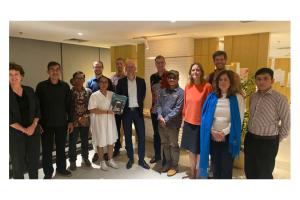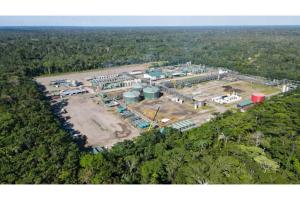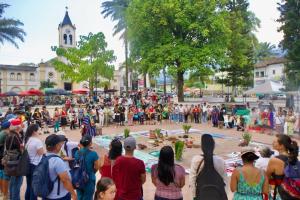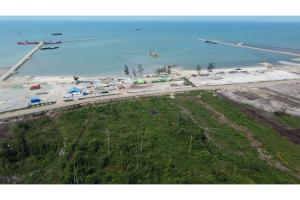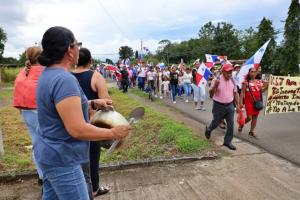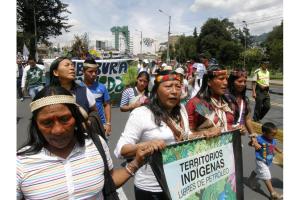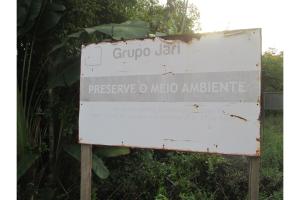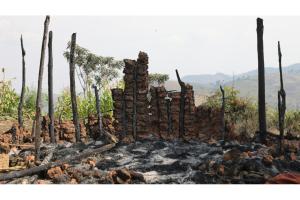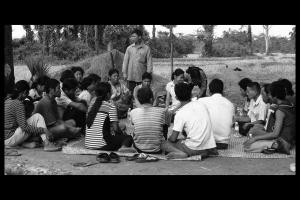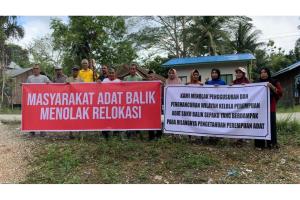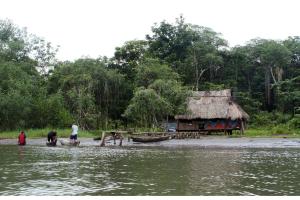Struggles for the Forests
When corporations destroy forests, or restrict or even prohibit access to forest peoples' territories, they place communities' ways of life and their very existence at risk. WRM supports forest peoples' struggles to defend their territories, and their right to decide how to live, and how to use the forests they depend on.
Articles
9 May 2024
JATAM East Kalimantan denounces the recent move of the Indonesian Minister of Public Works and Public Housing, Basuki Hadimoeljono, to appeal against the decision of a State Administrative Court in Jakarta that the government should make public a number of documents that it had kept secret.
Bulletin articles
26 February 2024
The Ecuadorian people's decision to stop oil extraction in the Yasuní National Park now brings new challenges: How do you recover a territory that has been sacrificed, and bring justice to affected areas, with the solidarity of the whole country?
Bulletin articles
26 February 2024
Mocoa is located between the Andean mountains and the Colombian Amazon, in the middle of one of the most important river basins of the country; in this territory, indigenous communities, Afro-Descendants, peasants and settlers coexist. The growing demand for minerals for the “decarbonization” of the world is a threat to this region, where mining companies are trying to move forward with underground copper extraction.
Bulletin articles
19 December 2023
President Jokowi calls the Kalimantan Industrial Park Indonesia (KIPI) “the largest green industrial area in the world”. But in reality, there is nothing green about the KIPI. It will lead to massive fossil fuel use, land and water grabbing, while threatening thousands of people in coastal communities with forced eviction. (Available in Indonesian).
Bulletin articles
19 December 2023
2023 culminates with a victory for the popular struggle to defend life in Panama. This will influence every corner on earth where, in the face of environmental conflicts, people are resisting and defending their territory.
Bulletin articles
25 October 2023
In this editorial, at a time in which elites and oil companies continue to cling to the power and profit derived from fossil fuels, we would like to acknowledge the contribution that the Ecuadorian people have made to the world in the fight for territories free of oil exploitation.
Bulletin articles
25 October 2023
WRM’s reply to Biofílica Ambipar’s “Clarification Note” about the article "REDD and the Green Economy exacerbate oppression and deforestation in Pará, Brazil", written by WRM and published in its Bulletin of July 2023.
Bulletin articles
25 October 2023
With the support of international funding, the establishment of the Kahuzi-Biega National Park has led to the forced and violent eviction of the Batwa Indigenous People. The DRC government recently passed a new law on the rights of Indigenous Peoples, which, though a step forward, does not apply to lands that have already been designated as protected areas, nor does it make any mention of historic injustices.
Bulletin articles
25 October 2023
This time we would like to remember a Bulletin that includes ten important contributions around the issue of ‘rights’.
Bulletin articles
30 March 2023
A recent Popular Consultation in Ecuador attempted to include, among other things, ‘environmental services offsets’ as a constitutional right. The majority of voters voted against it. However, this attempt serves as a warning about the interests that wish to strengthen policies of appropriation and the commodification of nature.
Articles
13 March 2023
Indigenous people from Balik tribe in Sepaku Lama Village, North Penajam Paser Utara Regency, East Kalimantan, carried out an action rejecting the plan to evict their villages around and along the Sepaku river for the project management of Floods or normalization of the Sepaku River center of Indonesia new capital city.
Bulletin articles
12 September 2022
Behind each land grabbing there is also water grabbing. Land and water are interlinked and inseparable, and water, in this sense, is an essential aspect of land and life. It flows, transforms, nourishes and is being nourished by other living cycles. Water is thus an essential part of communities’ struggles.
